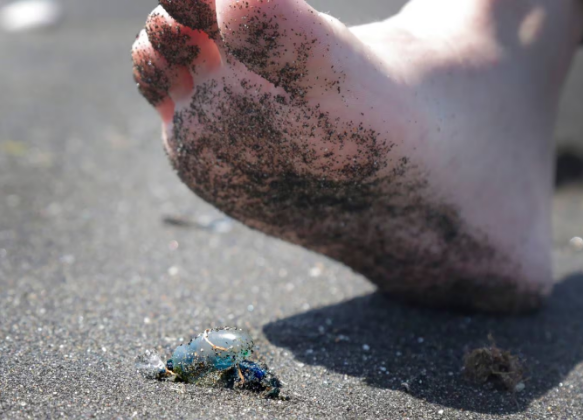
The council also said dogs should be kept on a leash to avoid them eating the poisonous jellyfish, which have been seen on the shores of Tāhunanui Beach and Rabbit Island.
"Keep your distance, put your dogs on a lead, and take care to avoid the venomous tentacles that can reach up to 10 metres in length. The tentacles can sting even after the bluebottle has died."
Niwa researcher Dr Dennis Gordon says it’s common to start seeing more jellyfish as we head into summer and the days get warmer.
"As soon as the days start to get longer and there’s more daylight, you get a bloom of more plankton. When there is more plant plankton, there’s more animal plankton, which means you get more shrimps and things – and jellyfish feed on those small crustaceans."
December in New Zealand is a common time to see an increase in jellyfish.
Surf Life Saving NZ national lifesaving manager and Omanu surf club’s Allan Mundy said in 2017 that, at this time of year, it was "very expected" to see the jellyfish around local beaches.
"Water temperatures have been warmer and when the temperature gets to around 19 or 20 degrees you’ll see waves of bluebottles coming in."
"They really are beautiful, they’re cobalt blue and look like a little plastic bag, underneath is a darker purple-blue with an acorn-shaped bag with tentacles."
He said at high tide the bluebottles could settle on the sand but could still sting, which could have a punch.

"Little girls could be walking along and see how pretty they are and go to pick them up."
If stung by a jellyfish, it’s important not to panic - the sting, while painful, is unlikely to cause serious harm.
While still at the beach, it’s recommended to wash the stung area with seawater and carefully remove any tentacles that might have stuck.
Use a towel to make sure you don’t get more stings on your hand, and then once you’re back home immerse the area in hot water (around 45C) for 15 to 20 minutes.
Do not use any vinegar, or methylated spirits to help with the sting, but take pain medication.
If at any point you have swelling in your face, shortness of breath or a tightness in your chest seek medical attention, as this could be the beginning of anaphylaxis.
If your dog eats a jellyfish, go straight to the vet as the sting could cause swelling in its throat.












